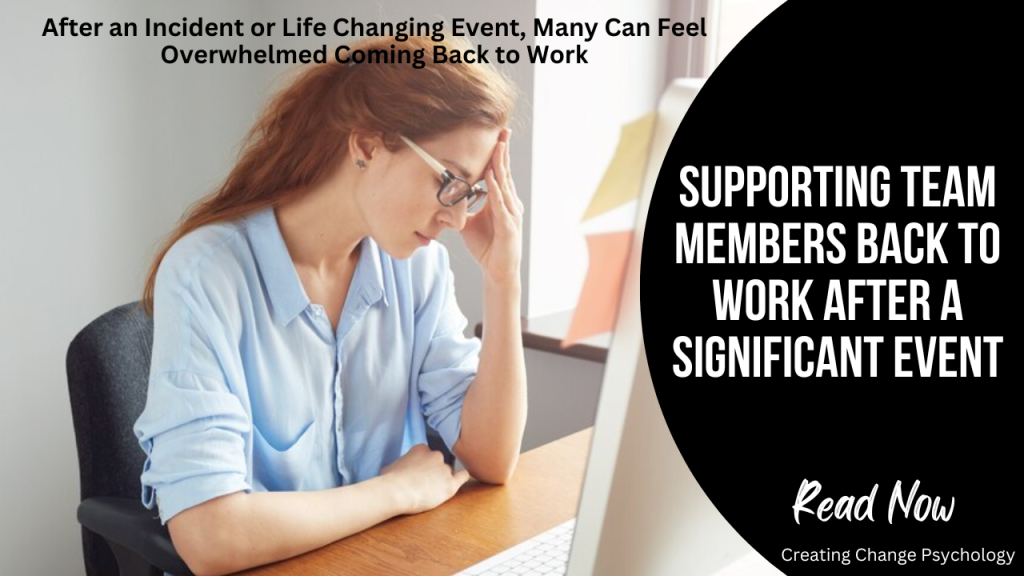Returning to the workplace after a significant event can feel overwhelming for many.
Whether it’s the passing of a loved one, a serious injury, a traumatic experience, or a major life change, the transition is not just about physically returning to work; it’s also about managing emotional and mental well-being in an environment that might feel ‘different’ or daunting. As a colleague or an employer, supporting team members during this time is crucial to ensuring they feel welcomed and understood during their reintegration to work.

Whether you’re helping a colleague or guiding your team through this transition, it’s important to approach this situation with empathy, patience, and understanding. Below are some mindful strategies that can help ease the return to work. These are not only for the individual returning, but can also guide other employees at work with supporting team members through this journey and making them feel included and welcome.
4 Mindful Ways to Support a Team Member’s Return to the Workplace
1. Prioritise Self-Care and Encourage Positive Habits
When returning to work after a significant event, self-care becomes even more crucial. Encourage your team members to maintain the habits that contribute to their mental and emotional well-being. If they’ve developed new routines or hobbies during their time off—such as mindfulness, exercise, or creative outlets—encourage them to continue these activities. These positive habits can offer a sense of stability and balance during this period of adjustment.
While time may feel more limited upon returning to work, it’s important to reassure them that their well-being comes first. As a team, show support by offering flexibility where possible and acknowledging the importance of self-care.
2. Manage Information Intake to Avoid Overwhelm
In times of change, especially after a significant event, too much information—especially from external sources—can feel overwhelming. Encourage your colleague to focus on receiving reliable and relevant information, whether it’s updates from the workplace or government announcements about safety and health protocols.
As a supportive team, ensure that you are offering clear, concise, and helpful communication. Help them navigate the influx of new information, and reassure them that the workplace is a safe space where their needs will be met.
3. Foster a Mentally Healthy Workplace
Creating a mentally healthy workplace is a collective responsibility, and it’s even more important when someone is returning after a difficult event or time in their life. Open communication and understanding of mental health risk factors can make a huge difference in how supported someone feels. Encourage team members to speak up if they feel overwhelmed, stressed, or anxious about their return.
As a team, work together to ensure a balanced workload, regular breaks, and open channels for discussing mental health. This will help reduce burnout and build a stronger, more resilient workplace for everyone.
4. Celebrate Reconnection and Offer Emotional Support
While the individual may have been away, life at work continued—but that doesn’t mean the small moments of connection should be overlooked. Help the returning team member feel part of the community again by celebrating their presence and take the time to reconnect. Small gestures like morning coffee runs, hallway chats, or lunch break conversations can help rebuild a sense of normality and belonging.
If your colleague feels comfortable, organise a low-key team gathering to welcome them back. These moments can go a long way in helping someone feel supported and integrated, reinforcing a supportive culture after a significant event or incident.
H3 – Remember, this transition is unique for everyone.
Offering a supportive, understanding, and flexible environment will allow your team member to find their rhythm again. Whether they are returning after a loss, injury, or major life change, supporting team members with empathy and encouragement can make all the difference in their journey back to work.
As supporting employees and employers in any business, at Creating Change we offer an Employee Assistance Package (EAP) to help your team member through their challenges, to get back to work and feel more themself again.
Read more information on EAP below.
Written by Rebecca Deane – Clinical Psychologist – www.creatingchange.net.au
Psychology support in the Hills District, Western Sydney & Surrounds (including Rouse Hill, Bella Vista, Glenwood, Castle Hill, Kellyville, The Hawkesbury, Penrith Nepean, Blacktown, Epping, Ryde, Pennant Hills areas and surrounds)

